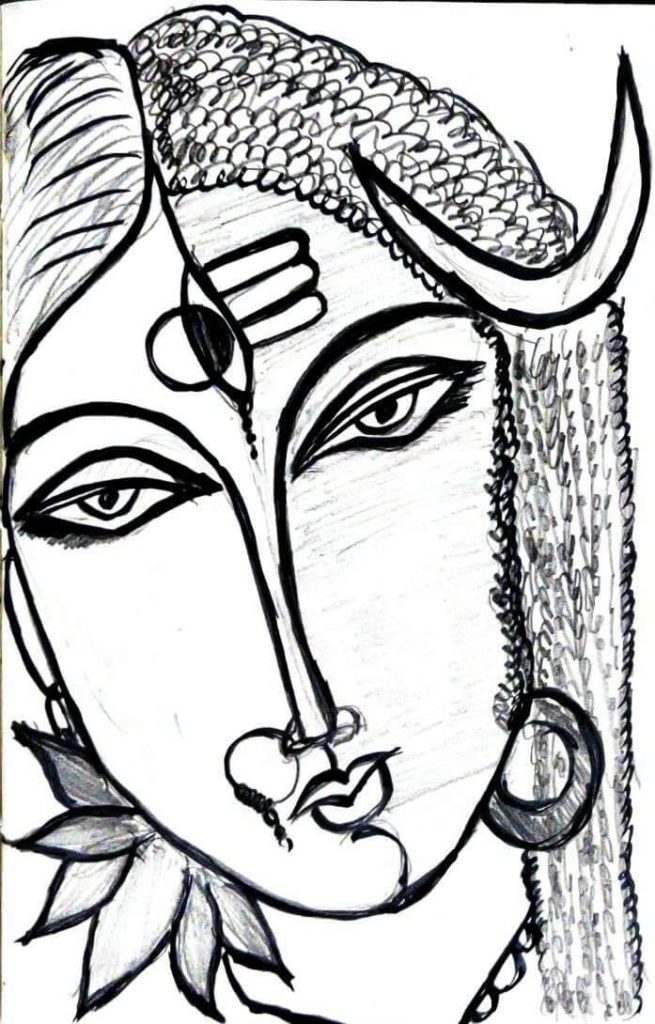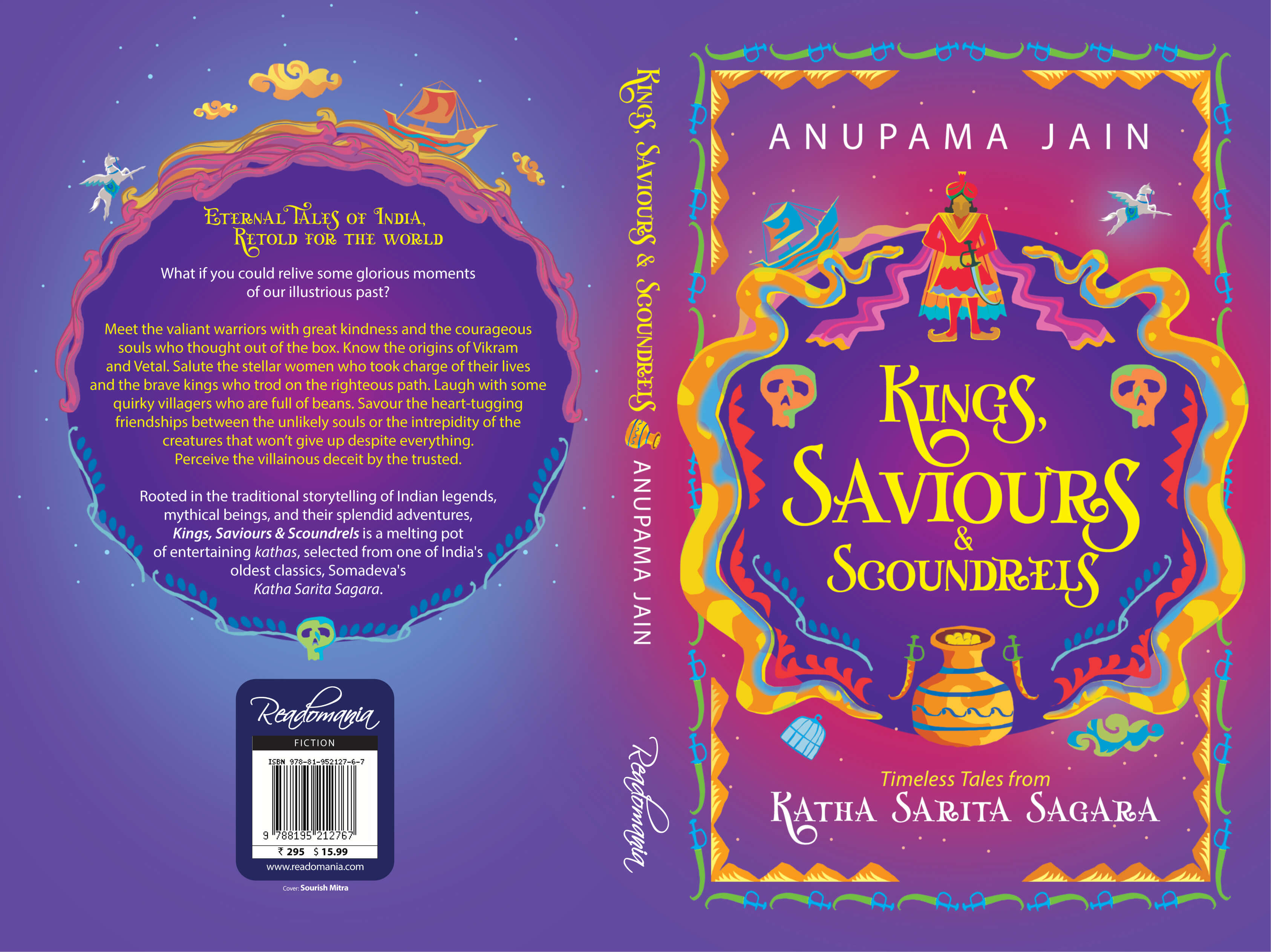Reading Time: 7 minutes
Here’s a book extract from Kings, Saviours & Scoundrels, by Anupama Jain, published by Redomania. An exclusive for Different Truths.

I am Somadeva, the son of Rama, a Shaiva Brahmin from Kashmir. I am also the poet-courtier of King Ananta of Kashmir.
My most famous work, Katha Sarita Sagara is a compilation of varied stories, though a much smaller version of its origin, Brhatkatha, by Gunadhya.
Katha Sarita Sagara has its genesis in Mount Kailasa, the abode of Lord Shiva, the Destroyer.
Once upon a time, the trident holding Lord Shiva held court at Kailasa. The crescent moon shone brightly in his matted hair, the beaming daughter of the mountain, Parvati, adorned his left side. His Ganas, Vidhyadharas, and Gandharvas sang great praises in his glory for vanquishing a deadly asura.
Later, when they retired to their chambers, Shiva asked Parvati, “My dear one, tell me how can this splendid hour be made better?”
Parvati requested Shiva, “My Lord, I want you to narrate to me stories that have never been told.”
Shiva smiled at Parvati indulgently. “My beloved, you are the Jaganmata. Can anything in these three worlds happen without your knowledge? But, your request is my command. I shall try and recount a new tale, to please you.”
As the couple enjoyed their private moments filled with mutual love, Nandi, the bull, stood guard. Meanwhile, Pushpadanta, one of the finest of Ganas, arrived at Kailasa. He wanted an audience with the Lord right away about a pressing matter. Nandi would not let him in, saying Shiva and Parvati were in deep conversation and couldn’t be disturbed.
Utterly curious at what was transpiring between Shiva and Parvati, Pushpadanta, using his magical powers, made himself invisible and entered the inner chambers of the couple. Pushpadanta then overheard Shiva tell Parvati, the exciting and extraordinary adventures of the seven famed Vidhyadharas.
He was absolutely enthralled by these epic tales. He repeated those stirring stories to his wife Jaya. Jaya, Parvati’s attendant, retold the stories to her mistress.
Now, Parvati was very upset with Shiva. In her anger, she accused Shiva of deceiving her. Hadn’t Shiva assured her that no one else had ever heard those stories? He had promised the stories were created for her but sadly the entire world now knew those tales.
A stung and irate Shiva found out that it was Pushpadanta who did not respect the personal conversations of Shiva with Parvati.
An enraged Parvati summoned Pushpadanta. “You will lose the very magical powers which you have misused to overstep your boundaries. You will be born as a human without any recollection of your celestial past. So be it.”
When Malyavan, another Gana, interceded on behalf of Pushpadanta, he too was cursed to be born as a human by a furious Parvati.
A repentant Pushpadanta begged for forgiveness for his transgressions and sought a remedy for the curse.

The ever-forgiving Parvati relented and gave him the solution, “Pushpadanta, you will return to Kailasa when you meet with a Yaksha. This Yaksha was cursed by Kubera, the God of Wealth, to spend some time on earth as a Pisachi named Kanubhuti. You will then remember your Gana origin, your time in here serving the Lord. You will regale Kanubhuti with all the stories you have overheard Shiva narrate to me. Once the narration is complete, you will be free of my curse.”
Malyavan too requested Parvati for the antidote to his curse.
Parvati smiled, “Malyavan, in due course of time, Pisachi Kanubhuti will meet you. He will narrate to you those very same tales told to him by Pushpadanta. This will end Kanubhuti’s mortal journey on earth. When you write down all the stories retold by Kanubhuti and make them famous, you too would be rid of your human form.”
A tearful Pushpadanta and Malyavan bowed to Parvati and almost immediately descended to earth to live out their respective curses.
Pushpadanta and Malyavan were born as two brahmins, Vararuchi and Gunadhya, both having no recollection of their heavenly origins.
When Kanubhuti, who was an ardent devotee of Lord Shiva, a cursed Pisachi dwelling in the Vindhya forest met Vararuchi, Vararuchi remembered his past life as Pushpadanta. Vararuchi described to Kanubhuti, the heroic tales of the seven Vidhyadharas that he as Pushpadanta the Gana, had overheard in Mount Kailasa.
After many twists, turns, adventures, trials, and tribulations, Pushpadanta eventually overcame his curse by perishing in a raging fire. Having shed his human form, Pushpadanta proceeded towards Kailasa to join his lord.
Malyavan or Gunadhya, after a dispute with a pundit, had to eschew using Sanskrit and Prakrit for his works. A stung Gunadhya learned the Paischi language. This new skill helped Gunadhya understand the tales narrated by Kanubhuti, the Pisachi, which were originally spun by Lord Shiva, much better.
As Kanubhuti narrated, Gunadhya wrote the tales of the seven Vidhyadharas, or Brhatkatha, on the barks of the trees of the thick forest, with his blood. Gunadhya was fearful of his composition on celestial beings being stolen.
On completing his seven hundred thousand verses, desirous of a wider audience for his epic, Gunadhya sent his two disciples, Gunadeva and Nandideva to the court of Satavahana, King of Pratishthan. The King found Gunadhya’s Paisachi work written in human blood utterly repugnant. He dismissed the disciples right away.
A heartbroken Gunadhya went back to the forest, built a fire, read each verse aloud to his two disciples, the teary-eyed birds, the beasts who grew calmer, the spirits that became gentler, and all the other creatures that listened to his tales with rapt attention. He then wearily consigned leaf by leaf to the hungry flames.
It was as though time had stood still as the raging fire devoured Gunadhya’s work.
When King Satavahana heard about this destruction of an epic creation, he was repentant at once. King Satavahana rushed to the jungle to save the stories, and to seek Gunadhya’s forgiveness.
Gunadhya gave the remaining hundred thousand verses containing the story of Naravahanadatta, to King Satavahana who carried them back to Pratishthan.
In Pratishthan, with the aid of two disciples of Gunadhya, Gunadeva, and Nandideva, the King translated the work from the Paisachi language.
Gunadhya thus released from his curse, left his earthly abode to the celestial world.
The legacy of Brhatkatha had endured centuries.
The hundred thousand verses that were saved, told the story of Naravahanadatta, the son of the legendary King Udayana, his adventures, his encounters with celestial beings, his dalliances with damsels of beauty, and his terrible wars with enemies.
I, Somadeva, the poet-courtier, have recounted various tales from the Katha Sarita Sagara to my royal highness. In the many sub- tales within that broader narrative framework, I have tried to tell tales exemplifying love, infidelity, death, rebirth, sacrifice, courage, cowardliness, honesty, joy, sadness. My tales had snake gods, enchanted princesses, and warrior-kings, rakshasas, celestial apsaras, talking birds, swindlers, Vidyadharas, Yakshas, and Yoginis, who were from the three worlds of heaven, earth, and hell, as principal characters.
With my stirring sagas, I hoped that the Queen Suryavati of Kashmir could draw some much-needed solace during her times of angst and utter turmoil. Unlike the rulers in my stories, my King Ananta of Kashmir had a difficult reign. Though he and Queen Suryavati had two sons, Kalasa and Harṣa, both princes weren’t noble. Prince Harsa was brilliant but ruthless. Kalasa led a depraved and degenerate life. With King Ananta tied up in the affairs of the state, and with no domestic bliss or harmony in her palaces, Queen Suryavati grew increasingly despondent. King Ananta eventually committed suicide and the Queen ended her life by self-immolating on his funeral pyre.
My benefactors might have had a tragic and untimely end, but my Katha Sarita Sagara, with its riveting tales, has lived on through ravages of time, passed on by generations as their legacy, because evocative stories make the abstract meaningfully concrete!
Stories are seeds of inquiry planted into the fertile soil of young brains from which saplings of imagination and creativity sprout.
What follows are a few chosen tales to retell by this author.
As a storyteller I hope, these resonate.
About the Book
Eternal Tales of India, Retold for the world.
What if you could relive some glorious moments of our illustrious past?
Meet the valiant warriors with great kindness and the courageous souls who thought out of the box. Know the origins of Vikram and Vetal. Salute the stellar women who took charge of their lives and the brave kings who trod on the righteous path. Laugh with some quirky villagers who are full of beans. Savour the heart-tugging friendships between the unlikely souls or the intrepidity of the creatures that won’t give up despite everything. Perceive the villainous deceit by the trusted.
Rooted in the traditional storytelling of Indian legends, mythical beings, and their splendid adventures, Kings, Saviours & Scoundrels is a melting pot of entertaining kathas, selected from one of India’s oldest classics, Somadeva’s Katha Sarita Sagara.
Selling Point
1. Stories from Katha Sarita Sagara written for a modern audience.
2. Beautiful illustrations done by the author
About the Author
Anupama Jain is the author of:
1. When Padma Bani Paula, listed as ‘One of the 5 best books of 2018 – Fiction’, by readwriteinspire.com. It is a breezy novel about second chances of life and the importance of staying true to one’s roots.
2. Masala Mix: Potpourri of Shorts, a vibrant short story collection on myriad manifestations of love.
3. She is a co-author of 10 anthologies across genres, one of which is a LIMCA record holder as India’s first Composite Novel.
Anupama has won multiple awards for her writing be it ‘The Orange Flower Awards’ for humour, or @momspresso awards for fiction, and parental blogging. She was listed as one of the 10 Indian women bloggers, a feminist must follow, by Women’s Web. She blogs at akkaacerbic.wordpress.com (listed in the Best Indian Blogs Directory 2018, under Topical Matters and Current Affairs). Anupama writes an award-winning satirical series at readomania.com, ‘AJ Wants to Know’, taking on the quirky world around with its vagaries. Anupama is the Founder & Admin of ‘SeniorSchoolMoms’, which won the Orange Flower Award 2021, for Best Facebook Groups. She is also the Head (Content & Collaborations) at Incredible Women of India.
(Contributed by Dipankar Mukherjee, Publisher, Readomania).
Editor’s Note: Excerpted with permission from the publisher. It is reproduced as received. DT has not edited it.
Publishers, authors, or literary agents may please send Book Extract (fiction and nonfiction in the English language), in not more than 3000 words, including Author’s Bio. Send it to different.truths2015@gmail.com, marking Book Extract in the subject line.














